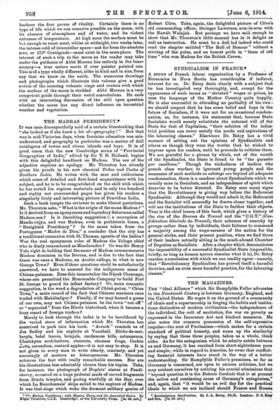SYNDICALISM IN FRANCE,*
A STUDY of French labour organization by a Professor of Economics in Nova Scotia has considerable if indirect, interest for us. Dr. Estey deals clearly with a subject that he has investigated very thoroughly, and, except for the appearance of such terms as " elevated " wages or prices, he uses the language of the Mother Country quite happily. He is also successful in obtruding no partiality of his own : we should suspect that he has some belief and hope in the future of Socialism, if it were not for an occasional condem- nation, as, for instance, his statement that, because State Socialists would merely substitute the external will of the State for that of Capitalism, "their solution of the indus- trial problem can never satisfy the needs and aspirations of the labouring classes." Elsewhere Dr. Estey has a vivid manner of setting out the opinions of Syndicalists and others as though they were the truths that he wished to impress upon his readers, until he proceeds to criticize them. We are grateful for a phrase by which, out of the mouth of the Syndicalist, the State is found to be "the parasite par excellence." Though the wickedness of leaders who preach class warfare to ignorant young people and the meanness of such methods as sabotage are beyond all adequate condemnation, there is a candour about Syndicalists which we usually miss in Socialists, and an independence of spirit which deserves to be better directed. Dr. Estey sees many signs that the Revolutionary is giving way before the Reformist Syndicalist. Although they would not admit it, the Reformist and the Socialist will assuredly be drawn closer together, and will use the institutions of the State to further their objects. That is the chief lesson of this book, which gives a history of the rise of the Bourses du Travail and the " C.G.T." (Con- federation Generale du Travail), their schemes of anarchy by groups rather than by individuals, their failures to command a majority among the wage-earners of the nation for the general strike, and their present position, when we find three of their leaders actually sitting in the much-abused Chamber of Deputies as Socialists. After a chapter which demonstrates the impossibility of a successful Syndicalist State (impossible, briefly, so long as human nature remains what it is), Dr. Estey reaches a conclusion with which we can readily agree—namely, that "Revolutionary Syndicalism has proved itself a harmful doctrine, and an even more harmful practice, for the labouring classes."










































 Previous page
Previous page